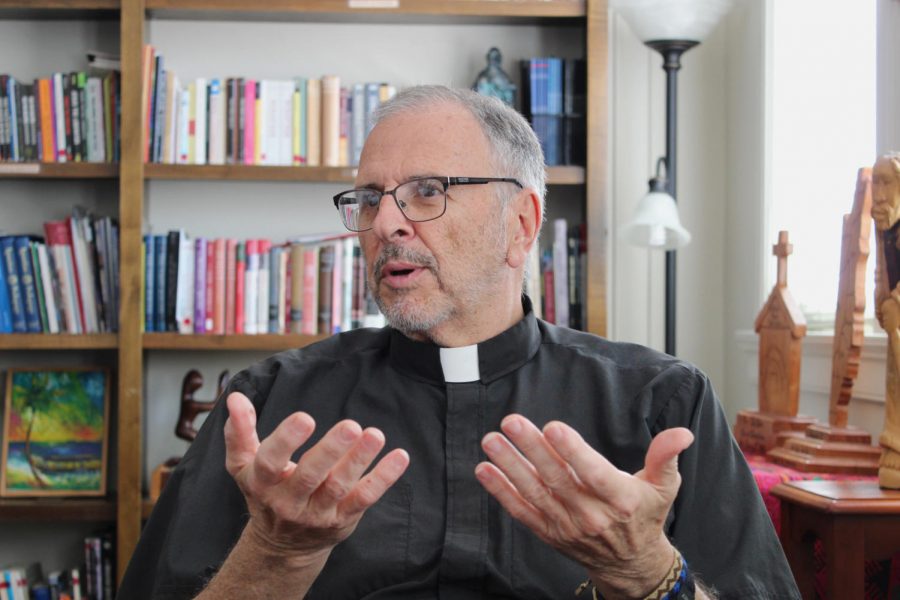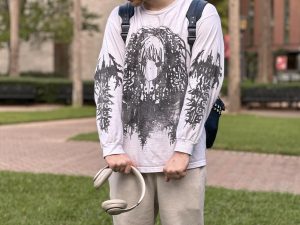Loyola grapples with abuse allegations against former university priest
The Rev. Ted Dziak, S.J., sits in his office in the Department of Mission and Ministry on March 26, 2018. Former staff members accuse Dziak of abusing his power. Photo credit: Jawdat Tinawi
April 22, 2021
Tim Ballard, a previous employee of Jesuit Volunteers International, who came forward with rape accusations against former Loyola vice president the Rev. Ted Dziak, S.J. in an article released by nola.com April 18, told The Maroon he will never forget a call he received when he was abroad in June of 2005.
The call was from Dziak, a Jesuit priest and the man Ballard had worked closely with while mentoring students in Belize as a part of the service of Jesuit volunteers, the same man Ballard is alleging raped him during their time in Belize between 2004 and 2006.
As Ballard overlooked the Belizean ocean view and paced along a veranda listening to Dziak on the phone, Dziak told him he’d be returning to Belize after he’d already completed his three month contract and Ballard thought he was done. As soon as Dziak said he was going to return, Ballard said he wanted to die.
“I knew he was coming back for me,” Ballard said.
Ballard said what has halted his healing more than anything, though, is the lack of investigations that have been conducted in an effort to prevent abusive behaviors like those Ballard is alleging.
Now, with sexual assault allegations and cases plaguing the nation, Loyola looks toward a way to move forward, and University President Tania Tetlow said her background as an attorney in fighting for survivors of sexual assault makes her capable of editing the systems in place to support students in the best way possible.
Ballard called on Tetlow to go back and investigate. Tetlow said last semester was the first time she heard of Dziak’s allegations of sexual assault when a reporter called Loyola in the fall.
While the reporter told Tetlow in September 2020 that there was an allegation against a former employee, Tetlow says the reporter initially did not gave her the name of the victim, or the victim’s attorney, and she had no way of reaching anyone involved. She says she only learned the names of the people involved from the reporter shortly before the nola.com article was published.
Reports against Dziak from the past linked to his temper and alleged emotionally abusive behavior, were filed at Loyola, though Tetlow said there are no allegations on file for sexual assault against the former vice president. Ballard was never a student at Loyola, and there were no known cases of accused sexual abuse involving Dziak and anyone associated with Loyola.
Former Jesuit volunteer Katrina Weschler led the movement to report Dziak’s alleged abusive behavior to the university and the archdiocese, among others in 2010 and 2011 when she was a Jesuit fellow at Loyola. Weschler said everybody had a “Ted story,” which she referred to as anecdotes of Dziak’s inappropriate behavior and how it affected nearly everyone he worked with.
Weschler, who traveled with Dziak to Belize through the Ignacio Volunteer Program in 2010 and 2011, said she filed a complaint with human resources at Loyola following that trip. She worked with colleagues and students who said Dziak had made them uncomfortable and compiled letters from each of them to present to human resources.
Weschler said there were no complaints of sexual assault she submitted to the office at the time.
“I knew I didn’t have a smoking gun that would serve as conclusive evidence of a fireable offense, but I also knew something was not right,” Weschler said.
Regardless of the reported severity of the alleged abuse, Weschler said being on Dziak’s bad side was “entering psychological warfare.”
“He’s a sick and probably hurt man, and he took it out on innocent people that are really only trying to do good,” Weschler said.
The reports against Dziak were filed with the Jesuit Central Province. When The Maroon contacted the Central Province, they said Dziak was no longer under their jurisdiction and instead a part of the Jesuit Eastern Province.
Dziak did not return a message left for him at the retreat center where he now lives in Weston, Massachusetts in the Eastern Province.
In an effort to get away from Dziak, Weschler said she requested to move desks and for her direct supervisor to change. Weschler said she luckily made the switch, though she was still dissatisfied with Loyola’s response, which eventually was asking Dziak to take a break, go to counseling and only go to parts of the volunteer trips abroad.
Weschler said she still isn’t impressed with Loyola’s response, hoping current leadership takes a second look and opens an investigation.
“They don’t need to dig very deep, and we’ve given them multiple shovels,” Weschler said.
Ballard seconded Weschler’s remarks when he told The Maroon that Tetlow’s statement released after the nola.com article on April 18 hurt him. Ballard said the part of Tetlow’s statement that encouraged due process for Dziak and asked students to “await the facts,” was deeply offensive.
“She’s been sitting on this for nine months, and this is her response,” Ballard said, adding “I’d love to sit down with her in a court of law and see whose facts hold up.”
Ballard’s attorney said the statement affected Ballard deeply.
“Tim was so relieved to have the story out and then, when he read the statement, in a way, he’s abused all over again,” Ballard’s attorney said.
Ballard and his attorney said they have had trouble filing both criminal and civil cases against Dziak due to struggles with statutes of limitations and the alleged abuse having been in Latin America. No cases have been filed to date.
Tetlow told The Maroon she apologized for hurting Ballard in her statement.
“I think that any survivor feels quantities of pain that are hard to imagine, so I never question that but I do believe in process and a bare minimum of what we owe ourselves in finding out the truth,” Tetlow said.
Regardless, Tetlow said any behavior that is harmful to students shouldn’t be tolerated, though she did mention terminating a professor on the ground of alleged emotional abuse is difficult.
“I know that complexity can sound like an excuse sometimes but it is not always easy to get rid of people on that ground, particularly when they are protected by tenure,” Tetlow said.
Ballard said taking note of allegations of emotional abuse is important to protecting students from physical and sexual abuse down the line. He said the way the grooming process begins is simple and just as painful.
Andrew Ryan, another volunteer who worked with Dziak in the Jesuit center at Loyola said Dziak was one of the scariest people he’d ever known.
While Ryan applied for a different position, Dziak hired him on as a volunteer to travel to Belize and Jamaica on the corps’ organized trips.
Ryan said at the time it was his dream job, so he took it and began working closely with Dziak.
Ryan said Dziak engaged in multiple inappropriate behaviors. Once, he said Dziak yelled at him for wearing the wrong kind of underwear, which he saw because Dziak made all the men on the trips abroad change in the same room.
He would make men get naked around him, according to Ryan, and he’d do the same thing when students would change when about to go swimming. Whenever someone tried to go to the bathroom to change, Dziak would bang on the door for them to come back to change in the group, according to Ryan.
“He would say ‘In my day, all the boys swam in the pool naked together,’” Ryan said.
Ryan also said Dziak’s position as a priest allowed him to get away with his behavior.
“He had some cult following of students who would look the other way,” Ryan said.
Ryan said Dziak would also inappropriately rely on him for emotional support. Each night they would go out on the beach and Dziak would talk to him as though in a counseling session.
“I felt like I was a priest, and he was this broken little boy next to me,” Ryan said.
While Ryan explained much of Dziak’s alleged abuse was emotional, Ryan said Dziak made himself responsible for applying cream to everyone’s rashes, regardless of where they may have been.
“What happened here was him prodding and finding out who he could really fuck with, who he could push and push and push,” Ryan said.
Ryan said that at one point while working for Dziak he had a girlfriend and that Dziak was mad when Ryan told him about it.
Ryan said there was another time where he was having medical problems and often had to go to appointments. Ryan said Dziak questioned him often about that, and after being pushed to his limit, Ryan told him what he was going through.
Eventually, Ryan was asked for his contract to end. Ryan said the circumstances were jarring, but he was glad to leave and get away from Dziak.
Tetlow said in a statement after the release of nola.com’s article debuting Ballard’s rape allegations against Dziak that she encourages students to reach out with information regarding the former vice president. She told The Maroon that she encouraged this sharing of information both so that flaws in Loyola’s systems can be picked out, but also so Loyola can forward evidence to the Jesuit Province to aid in their investigation; the Province is the entity with jurisdiction over this case.
Tetlow said Loyola is also hiring a new General Counsel as soon as possible to help the university design its systems and improve them for those who may need to use them.
“I do not have the ability to promise that I can somehow make everything safe and fine forevermore because I know too much about how hard that is, but what I can tell students is that it’s been my life’s work to fight for that safety and that justice,” Tetlow said.









Prep Grad • May 28, 2021 at 6:17 pm
My prayers for healing to your family. There is NOTHING more painful. The pain is ever-present. I hope my message can help. Mother Angelica said to me, “Never let the sins of man separate you from the Eucharist. Satan knows he can never defeat the Body of Christ. Mary has already crushed his head.” She explained that Satan CAN only defeat mankind by separating man from the Body of Christ. Satan is trying to defeat Ted. Don’t add to the spoils of this war by abandoning your faith. It is quite possibly the hardest thing EVER imaginable. I am a victim at the hands of the church in CT. Ted needs to be held responsible. As well as those that were derelict in their duty to safeguard the community. And there is NO possible mortal restitution. What can Ted give you that would make this better? What could my purveyor of evil give me? Nothing! There is nothing on earth the value of that which has been lost. But Christ died for us all to defeat sin and conquer death. It is through the Holy Eucharist that we are healed by his Grace. “With His stripes we are healed.” Padre Pio, Pray for Us. AMDG
Roger Ballard • Apr 22, 2021 at 7:08 pm
So proud of our son to fight back against Ted Dziak , the monster the Catholic Church unleashed upon him while he was trying to give 2 years of his life sacrificing for THE JVI in Belize after almost 20 years of suffering from repressed memories he has taken a stand to reclaim his life and bring forth the truth about one of the many despicable figures who hide behind the robes and sanctions of the Vatican. Hopefully there is a special place in hell for the likes of Dziak and all the others who lurk in the shadows of that institution. Special thanks also to Tim’s wife Meg for standing beside through the torture that was inflicted upon them and and giving him the support and courage to carry on, we love you❤️